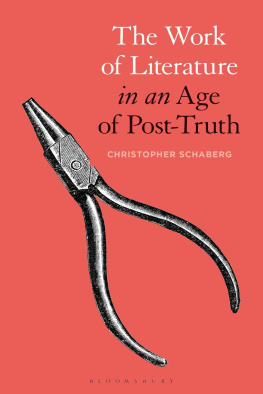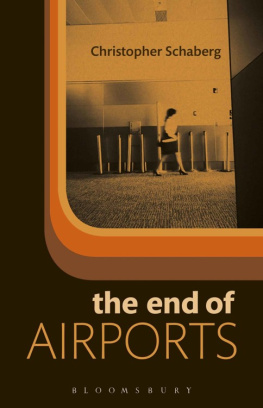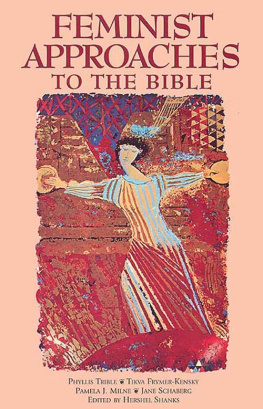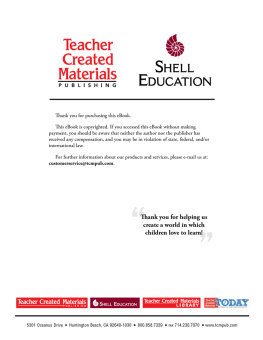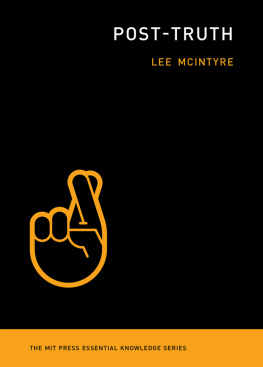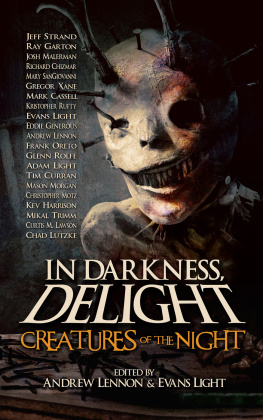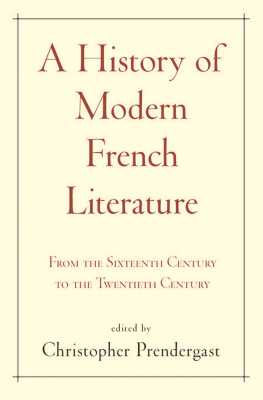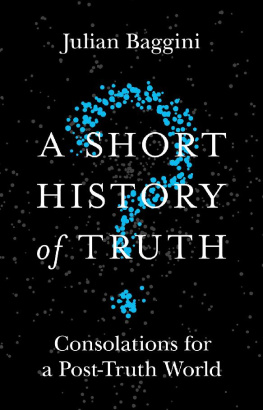Christopher Schaberg - The Work of Literature in an Age of Post-Truth
Here you can read online Christopher Schaberg - The Work of Literature in an Age of Post-Truth full text of the book (entire story) in english for free. Download pdf and epub, get meaning, cover and reviews about this ebook. year: 2018, publisher: Bloomsbury, genre: Art. Description of the work, (preface) as well as reviews are available. Best literature library LitArk.com created for fans of good reading and offers a wide selection of genres:
Romance novel
Science fiction
Adventure
Detective
Science
History
Home and family
Prose
Art
Politics
Computer
Non-fiction
Religion
Business
Children
Humor
Choose a favorite category and find really read worthwhile books. Enjoy immersion in the world of imagination, feel the emotions of the characters or learn something new for yourself, make an fascinating discovery.
- Book:The Work of Literature in an Age of Post-Truth
- Author:
- Publisher:Bloomsbury
- Genre:
- Year:2018
- Rating:5 / 5
- Favourites:Add to favourites
- Your mark:
- 100
- 1
- 2
- 3
- 4
- 5
The Work of Literature in an Age of Post-Truth: summary, description and annotation
We offer to read an annotation, description, summary or preface (depends on what the author of the book "The Work of Literature in an Age of Post-Truth" wrote himself). If you haven't found the necessary information about the book — write in the comments, we will try to find it.
The Work of Literature in an Age of Post-Truth — read online for free the complete book (whole text) full work
Below is the text of the book, divided by pages. System saving the place of the last page read, allows you to conveniently read the book "The Work of Literature in an Age of Post-Truth" online for free, without having to search again every time where you left off. Put a bookmark, and you can go to the page where you finished reading at any time.
Font size:
Interval:
Bookmark:

The Work of Literature in an Age of Post-Truth
For my students
The Work of Literature in an Age of Post-Truth
Christopher Schaberg

Contents
We apologists of the humanities havent always done the best job of justifying our vocation, but it seems to me that the book is the best place for our case to make itself.
Christy Wampole, On Distraction
Let us give the mind a new book, as one drops a lump of fish into a cage of fringed and eager sea anemones, and watch it pausing, pondering, considering its attack. Let us see what prejudices affect it; what influences tell upon it. And if the conclusion becomes in the process a little less conclusive, it may, for that very reason, approach nearer to the truth.
Virginia Woolf, An Essay In Criticism
A few years before writing this book, I might have celebrated the idea of arriving at an age of post-truth. In some ways, it sounds like a fundamental goal of literary studies: how readers learn to linger in and learn from uncertainty, ambiguity, and paradox. These are fruitful things in the literature classroomas well as for the thinker, writer, or artist more broadly. To be suspicious of truth, in this sense, is to be wary of Truth with a capital T: definitive or absolute claims that, in truth, are more nuanced and complex, more loaded with history. Such claims to Truth are usually in the service of an interest, a very subjective vector of power that is claimed to be ahistorical, universal. Careful study of rhetoric and context often reveals claims of Truth to be riddled with contradiction or indeterminacy. So getting to a place of post-truth may have sounded like a worthwhile venture, not so long ago.
But post-truth means something more sinister these days.
Post-truth was designated as 2016s word of the year by the Oxford Dictionary . It is a concept that became vivid during the aftermath of the 2016 US presidential election, but it is something that had been creeping and building for a while. To say that were in an age of post-truth is to suggest that this something has now crystalized and become glaringly apparent. This is the age when what is truthfully stated or factually reported can be dismissed as just wordsas Donald Trump put it in his first presidential debate with Hillary Clinton. And by merely retorting that something is not true, any further inquiry is halted. Or, conversely, by claiming something patently un true, one can nevertheless sow belief in such a form that floats freely away from actual life.
This is the age when grand narratives of progress are trembling at the brink, and when atavism is running rampant. Its the milieu when Friedrich Nietzsches once-radical arguments about the slipperiness of truths and the prismatic nature of perspectives become part of mainstream thought and culture (if in garbled and often misappropriated snippets). Thats just, like, your opinion, manso sneered Jeff Bridgess character Jeff Lebowski in the early 1990s, in the Coen brothers cult film The Big Lebowski (1998). Now those words sound less laughable, as theyve been deployed on a mass scaleanyone can claim this, and not even with irony. Climate change? Rising economic inequities? Structural racism? Erosion of civil liberties? Illegal collusions? Out-of-control gun violence? Thats just, like, your opinion, man.
In this atmosphere, how might literature be of help? Doesnt any work of literaturemuch less literary studiesopen the floodgates to endless interpretation, with no firm foundations to fall back on? When stories can go viral so quickly, with ruthless efficiencyregardless of their truth-valueof what use is the slower, clumsier process of liberal arts education, in which literature and literary studies (still) struggle to thrive?
I want to say that literature is something sure to hold onto in the choppy seas of post-truth, amid the swift currents of viral news. But this is strange to say, because some of the best literature unmoors , even as it grips the reader. This book is about what it means to be interested in literature and what it means to teach literature at the college level, in an age of post-truth.
This book is also about the connections between literature and environment, and about writing and teaching with place in mind. Part of the work of literature, I want to argue, is locating firm footing in the wild rapids of this time. Im using environmental language here deliberately, and I will return to questions of regional belonging and the aesthetics and ethics of place, throughout. While I primarily teach literature, my interests usually drift toward questions of ecology, and attunement to coexistence in ecosystems.
I put this book together while on sabbatical, up in Michigan. I was taking a year away from Loyola University New Orleans in order to finish another book ( Airportness: The Nature of Flight ), but during this time I was also reflecting on my work as a whole, and on the value and functions of what I doin the classroom, in my office hours, on my campus, and thinking and writing in the dark of night. I was also reconnecting with the place where I grew up, a place that I love. I thought that during my sabbatical I was going to work on a book about this place, a book about Michiganbut after Trump was elected president, I felt that I had to reassess everything, and that book got pushed to the backburner (well, sort of).
How am I supposed to keep teachingnot to mention readingliterature, when the highest public office of the United States is held by a person who is utterly unbound to the words he says, or for that matter, to what he tweets? Donald Trump has been unflappable about the fact that he doesnt read books, at least not in their entiretyhe doesnt have the time, apparently (Donald Trump Doesnt Read Books). Where does this leave books, in our cultural estimation? What is the role of literary writing in a time when widely read stories can appear (and sometimes actually be ) far more fictional and fantastical than we could ever imagine, much less closely read in the classroom? How can literature weigh in on matters of truth, when truth has been jettisoned for something so much more entertainingand even more persuasive?
My career up to this point has been premised on teaching college students to communicate clearly and honestly, to read widely and with savvy across literary periods and genres, and to develop a measured sense of critical awareness with respect to modern life. I believe in the importance of all these lessons. And yet, I find myself unsure of how to stand by my workagain, admittedly slow workin a culture that privileges viral storytelling, constant updating of narratives (self and otherwise), and snap judgments regarding things big and small, local and global. Literature is, if anything, a slow enterprise. Whether youre a reader, a writer, or a bookselleryou are in it for a relatively long haul in terms of literatures benefits and rewards. Literature is work : it takes work to create, read, disseminate, and preserve. A lot of this work is abstract and often obscured from public view. Literature can feel like a very private experiencewriting it, reading it, even teaching and learning it. But any way, at its most basic levelthink of a required high school or college English course, early encounters with canonical textsliterature is work . Its to this work that I attend in the present book, unraveling my own work in relation to literature, and thinking about the broader work that literature doesand is doing, and might doin an age of dubious connection to the written (and spoken) word.
Font size:
Interval:
Bookmark:
Similar books «The Work of Literature in an Age of Post-Truth»
Look at similar books to The Work of Literature in an Age of Post-Truth. We have selected literature similar in name and meaning in the hope of providing readers with more options to find new, interesting, not yet read works.
Discussion, reviews of the book The Work of Literature in an Age of Post-Truth and just readers' own opinions. Leave your comments, write what you think about the work, its meaning or the main characters. Specify what exactly you liked and what you didn't like, and why you think so.

